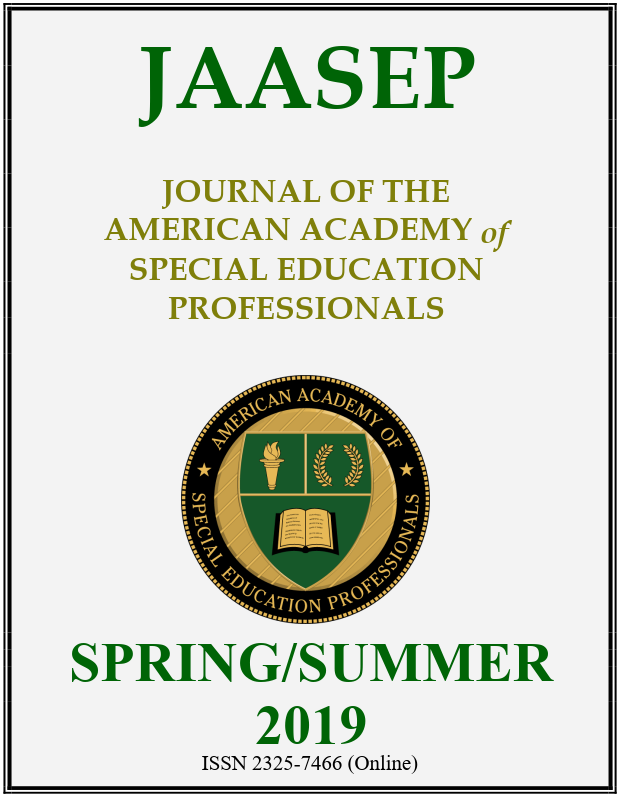Creating Self-Efficacious Special Educators through Mentoring during Teacher Preparation
Bandura, A. (1977). Self-efficacy: Toward a unifying theory of behavioral change. Psychological Review, 84(2) 191-215. DOI: https://doi.org/10.1037//0033-295X.84.2.191
Bandura, A. (1997). Self-efficacy: The exercise of control. New York, NY: W. H. Freeman & Company.
Beckford, C., & Roland, K. (2010). Supporting associate teaching and mentoring of teacher candidates: Building a community of practice. Literacy Information and Computer Education Journal, 1(2), 103-109. DOI: https://doi.org/10.20533/licej.2040.2589.2010.0015
Billingsley, B. (2003). Research summary: Special education teacher retention and attrition: A critical analysis of the literature. Gainesville: University of Florida, Center on Personnel Studies in Special Education.
Boe, E. (2006). Long-term trends in the national demand, supply, and shortage of special education teacher. The Journal of Special Education, 40(3), 138-150. DOI: https://doi.org/10.1177/00224669060400030201
Boe, E., Cook, L., & Sunderland, R. (2005, July). Turnover of special education teachers: New research on the extent and impact of exit attrition, transfer to general education, and school transfer. Paper presented at the 2005 OSEP Project Directors Conference, Washington, DC.
Brownell, M., Ross, D., Colon, E., & McCallum, C. (2005). Critical features of special education teacher preparation: A comparison with general teacher education. The Journal of Special Education, 38(4), 242-252. DOI: https://doi.org/10.1177/00224669050380040601
Council for Exceptional Children. (2013).What every special educator must know: Ethics, standards and guidelines (3rd ed.). Arlington, VA: Council for Exceptional Children.
Conover, W., & Inman, R. (1982). Analysis of covariance using the rank transformation. Biometrics, 38, 715-724. DOI: https://doi.org/10.2307/2530051
Cronbach, L. (1982). Designing evaluations of educational and social programs. San Francisco: Jossey-Bass.
Darling-Hammond, L. (2003). Keeping good teachers: Why it matters, what leaders can do. Educational Leadership, 60(8), 6–13.
Darling-Hammond, L. (2005). Teaching as a profession: Lesson in teacher preparation and professional development. Phi Delta Kappan, 87(3), 237-240. DOI: https://doi.org/10.1177/003172170508700318
Dewey, J. (1938). Experience and education. New York: The Macmillan Company.
Duffy, M., & Forgan, J. (2005). Mentoring new special education teachers: A guide for mentors and program directors. Thousand Oaks, CA: Corwin Press. DOI: https://doi.org/10.4135/9781483328898
Field, A. (2013). Discovering statistics using IBM SPSS statistics (4th ed.). Los Angeles, CA: SAGE Publications.
Hobson, L., Harris, D., Buckner-Manley, K., & Smith, P. (2012). The importance of mentoring novice and pre-service teachers: Findings from a HBCU student teaching program. Educational Foundations, 6(9), 67-80.
Hudson, P., & Hudson, S. (2013). Re-structuring pre-service teacher education: Introducing the school-community integrated learning pathway. Journal of Education and Learning, 2(1), 9-19. DOI: https://doi.org/10.5539/jel.v2n1p9
Hudson, P., & Skamp, K. (2003, July). An evaluation of a mentoring intervention for developing pre-service teachers primary science teaching. Paper presented at the annual conference of the Australasian Science Education Research Association, Melbourne, Victoria. Ingersoll, R., & Strong, M. (2011). The impact of induction and mentoring programs for beginning teachers: A critical review of the research. Review of Education Research. 81(2), 201-233. DOI: https://doi.org/10.3102/0034654311403323
Kline, P. (1999). The handbook of psychological testing (2nd ed.). London: Routledge.
Lee, Y., Patterson, P., & Vega, L. (2011) Perils to self-efficacy perceptions and teacher-preparation quality among special education intern teachers. Teacher Education Quarterly, 38(2), 61-70.
McLoughlin, A., & Maslak, M. (2003). Prospective teachers’ perspectives of development during fieldwork: Tutoring as a vehicle for professional growth. The Teacher Educator, 38, 267-284. DOI: https://doi.org/10.1080/08878730309555323
Mertens, D. (2010). Research and evaluation in education and psychology: Integrating diversity with quantitative, qualitative, and mixed methods (3rd ed.). Thousand Oaks, CA: Sage Publications.
Minke, K., Bear, G., Deemer, S., & Griffin, S. (1996). Teacher’s experiences with inclusive classrooms: Implications for special education reform. Journal of Special Education, 30(3), 156-186. DOI: https://doi.org/10.1177/002246699603000203
Nicol, A., & Pexman, P. (1999). Presenting your findings. Washington, DC: American Psychological Association.
Parameswaran, G. (1998). Incorporating multi-cultural issues in educational psychology classes using field experiences. Journal of Instructional Psychology, 25(1), 9-13.
Patten, M. (2011). Questionnaire research: A practical guide (3rd ed.). Glendale, CA: Pyrczak Publishing.
Plash, S., & Piotrowski, C. (2006). Retention issues: A study of Alabama special education teachers. Education, 127(1), 125-128.
Pendergast, D., Garvis, S., & Keogh, J. (2011). Pre-service student teacher self-efficacy beliefs: An insight into the making of teachers. Australian Journal of Teacher Education, 36(12), 46-57. DOI: https://doi.org/10.14221/ajte.2011v36n12.6
Reid, R., Vasa, S., Maag, J., & Wright, G. (1994). An analysis of teachers’ perceptions of attention deficit-hyperactivity disorder. Journal of Research and Development in Education, 27, 195-202.
Rotter, J. (1954). Social learning and clinical psychology. New York: Prentice-Hall. DOI: https://doi.org/10.1037/10788-000
Salant, P., & Dillman, D. (1994). How to conduct your own survey. New York, NY: John Wiley & Sons, Inc.
Smith, T., & Ingersoll, R. (2004). What are the effects of induction and mentoring on beginning teacher turnover? American Educational Research Journal, 41, 681-684. DOI: https://doi.org/10.3102/00028312041003681
Sweeny, B. (2008). Leading the teacher induction and mentoring program. Thousand Oaks, CA: Corwin Press.
Tschannen-Moran, M., & Johnson, D. (2011). Exploring literacy teachers’ self-efficacy beliefs: Potential sources at play. Teaching and Teacher Education, 2(4), 751-761. DOI: https://doi.org/10.1016/j.tate.2010.12.005
Tschannen-Moran, M., & Woolfolk Hoy, A. (2001). Teacher efficacy: Capturing an elusive construct. Teaching and Teacher Education, 17(7), 783-805. DOI: https://doi.org/10.1016/S0742-051X(01)00036-1
U. S. Census Bureau. (2012). Quickfacts data. Retrieved November 3, 2013, from http://www.census.gov
U. S. Department of Education. (2011). Individuals with Disabilities Education Act (IDEA) data. Retrieved November 3, 2012, from www.ideadata.org
Vygotsky, L. (1978). Mind in society: The development of higher psychological processes. Cambridge, MA: Harvard University Press.
Washburn-Moses, L. (2010, December). Rethinking mentoring: Comparing policy and practice in special and general education. Educational Policy Analysis Archives, 18(32). Retrieved from http://epaa.asu.edu/ojs/article/view/716 DOI: https://doi.org/10.14507/epaa.v18n32.2010
Woolfolk, A. (2007). Educational psychology (10th ed.). Boston, MA: Allyn & Bacon. Woolfolk, A., & Hoy, W. (1990). Prospective teachers’ sense of efficacy and beliefs about control. Journal of Educational Psychology, 82(4), 81-91. DOI: https://doi.org/10.1037//0022-0663.82.1.81
Downloads
Article Information
- Article Type Articles
- Submitted May 23, 2019
- Published June 15, 2019
- Issue Spring/Summer 2019
- Section Articles
